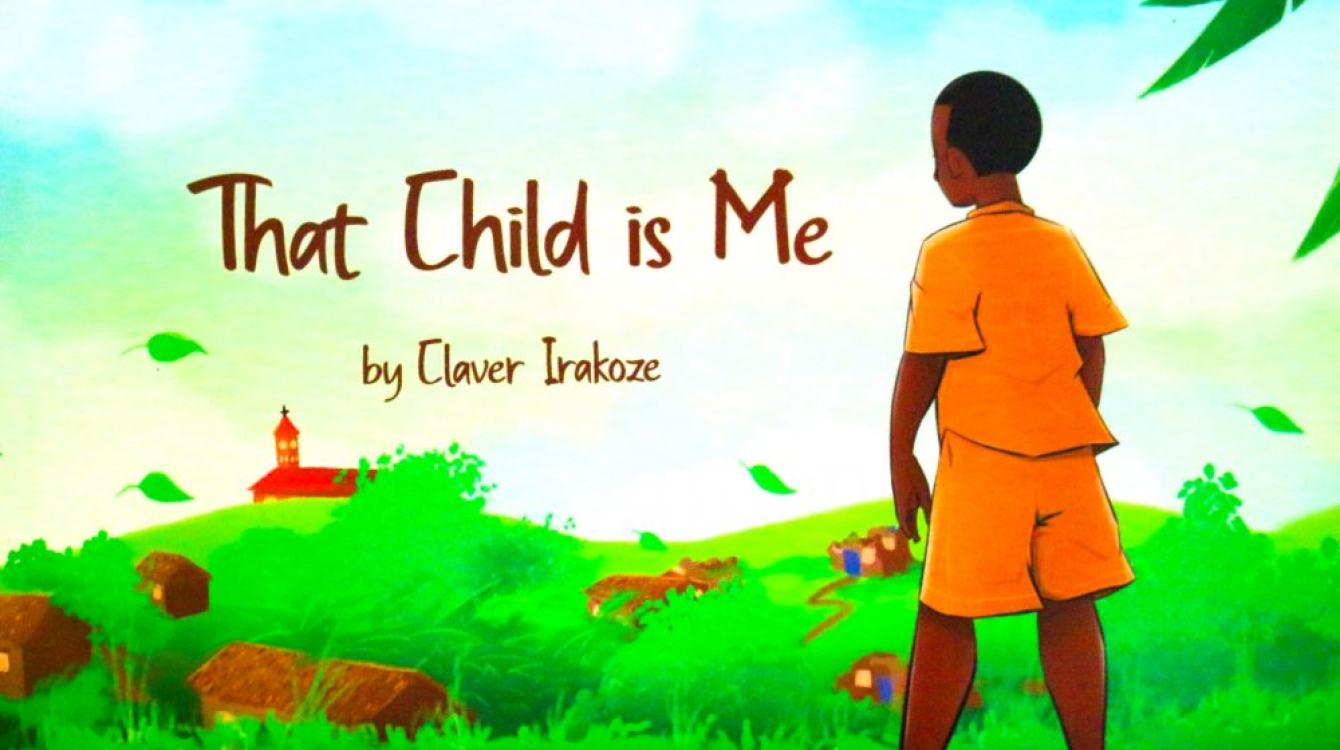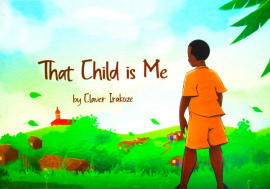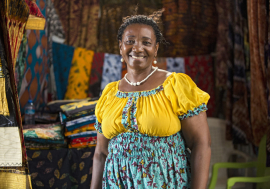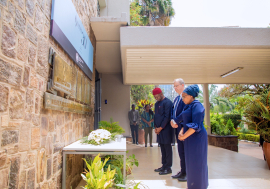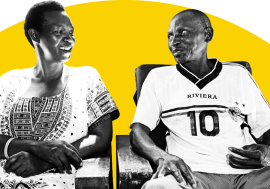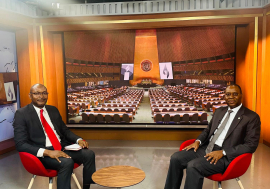Claver Irakoze, a survivor of the1994 genocide against the Tutsi in Rwanda, faces the complex challenge of explaining this dark period to his children. Striving to avoid passing on trauma or at least minimizing this real threat, he has authored books aimed at young readers, using storytelling to impart lessons of history, healing, and hope. Ahead of the 30th anniversary of the 1994 genocide against the Tutsi in Rwanda, Irakoze shares his approach to keeping the memory alive through education and dialogue, emphasizing the importance of preserving these narratives without causing harm.
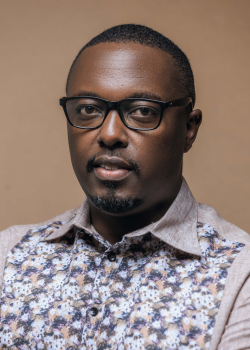
How do you respond to young children when they start asking questions about a national tragedy whose impact is still being felt in the nation and worldwide?
When it is your own children prompting you to relive a personally painful and deeply traumatic episode of that tragedy, the task can be even more daunting.
Claver Irakoze, a survivor of the 1994 genocide against the Tutsi in Rwanda, was less concerned about what to tell his children, but rather, how to say it.
“We shouldn’t pass on [our] trauma to our kids,” he said, in a recent conversation with Africa Renewal from his home in Kigali. “Still, we shouldn’t withhold everything either.”
He was 11 years old when his father and 60 other adult males, sheltering in the buildings of College Saint Joseph, a secondary school in Kabgayi, 60km south of the capital Kigali, were taken away by soldiers on April 28th, 1994, never to be seen again. There, the community witnessed horrendous acts, including the targeted taking and killing of individuals, like Irakoze's father.
Now an adult with a family of his own and faced with the innocence of his own children's inquiries about their lineage and history, he acknowledged an "urgent duty as survivors to testify to the dangers of hatred and discrimination."
With that sense of duty, Irakoze has written two books on the tragedy. First, "That Child in Me" was published in 2019, then "Transmitting Memories in Rwanda – From a Survivor Parent to the Next Generation" which he co-wrote and published in 2022.
He is not the first person to document the 1994 genocide against the Tutsi in Rwanda, but he is unique for having written with young children in mind.
Communicating atrocities to children
In writing "That Child in Me," the author’s primary goal was to connect with a young audience—specifically those aged three to twelve, he explained. But as navigating the delicate process of sharing stories of personal and historical significance with children presents a unique challenge, Irakoze decided to tread carefully by using illustrations, images, and simplified text designed to be accessible and engaging for them.
A music video titled "Umurage w’amateka" (the legacy of history) and published the year preceding the book gave early indications of the approach Claver would later take.
The video featured engaging animations, aimed at enabling audiences to visualize the difficult topics of the dark past and the present in a child-friendly manner.
“I used illustrations, images, very light texts that children can understand. And my intention was not to talk about the suffering of the past. The content is a combination of blissful memories that I had with my family and the dark that I'm not able to (directly) describe as genocide, but rather mentioned it as something that happened and changed my life.”
The result is a nuanced view of his childhood experiences, avoiding explicit references to genocide, and opting instead for language that conveys significant change and impact without inducing trauma.
With the second book, Irakoze aimed to initiate sensitive conversations, offering parents a means to engage with their children on the genocide.
"Transmitting Memories in Rwanda – From a Survivor Parent to the Next Generation," being more academic in its style, appears to be speaking to parents and attempting to equip them with tips to engage in meaningful conversations about the past with their children.
"We write to inspire, we write to preserve the memory, but we also write to educate," Irakoze explained.
And the feedback he received from both parents and children, he said, is positive, highlighting the books’ role in fostering inter-generational conversation.
Healing through writing
But as much as writing is a means to preserve memory and inspire others, he pointed out the experience is emotionally draining.
Yet, at the end of the day, “it helps you navigate and make sense of your past and present.”
In so saying, Irakoze echoes a general understanding among psychologists, grief counsellors, and practitioners that there is an intricate relationship between writing, memory preservation, and the healing process.
His act of writing hence turned out to be both a personal cathartic journey and a public act of memorialization, helping him and potentially his targeted audience: parents and their children navigate the complexities of trauma and recovery.
“By revisiting your past, you confront that fear that resides within you, and it helps you heal progressively,” he remarked.
He uses his writing to engage in a dialogue with both the past and the future, aiming to heal personal wounds while contributing to a broader understanding and remembrance of the atrocities experienced.
That experience is not straightforward, nonetheless.
“I cannot say the healing is completely achieved,” he conceded, “because healing is not linear. Today you are at a good level, and you feel better, but tomorrow a life experience hits you, and it reminds you what you miss or what you lost, and it takes you back."
While acknowledging the therapeutic potential of sharing and documenting traumatic experiences, Irakoze also recognizes the mental health risks associated with re-traumatization for both the storyteller and the audience.
He warned that the dual objectives of educating the public and preserving the dignity of survivors' stories must be navigated carefully to ensure that the educational value does not come at the expense of emotional harm.

Writing as an advocacy tool
That non-linearity of the process lends its force to continued advocacy. Because, in addition to memorialization and personal healing, he insists that writing, , can also serve as a critical tool for advocacy.
Irakoze uses writing as a form of advocacy—utilizing personal narratives to educate, inspire, and foster a culture of remembrance, peace and tolerance.
He believes that writing enables survivors to process their experiences, navigate their memories, and contribute to a collective understanding of the tragedy.
He hopes that sharing personal stories would inspire others, especially survivors, to document their narratives, thereby preserving memory and educating future generations.
Through his books, he seeks to convey messages of hope, the importance of critical thinking, and the value of making wise choices to avoid repeating the mistakes of the past.
Personal responsibility
As a survivor and memory worker, Irakoze feels a profound responsibility to share his experiences, advocate for understanding and tolerance, and support the healing of others.
“Genocide prevention cannot be achieved if we don't invest in educating the young generation to understand genocide in its comprehensive and wide sphere...the root causes of genocide, which are fueled by hatred and divisions.”
"Diversity should not mean division," he asserted, championing a future where the lessons gleaned from the darkest chapters of history pave the way for peace and unity.
When through writing, a survivor can turn his profound grief and the collective sorrow of a nation into a source of inspiration, urging the young and the old alike to remember, understand, and learn from the past, there is the transformative role of literature in fostering healing, reconciliation, and hope in the aftermath of tragedy.
However, most books on the 1994 genocide against the Tutsi in Rwanda, by Irakoze and others, have been written in internationally dominant languages: English and French.
That, Irakoze says, is a double-edged sword because while writing in internationally dominant languages broadens the reach, it simultaneously restricts accessibility to local populations who may benefit most from these narratives.
Still, writing in widely spoken international languages, he further pointed, also serves to challenge narratives that deny or minimize the scale and severity of the 1994 Genocide against the Tutsi.
Given that these narratives are primarily disseminated in international languages, he is prompted, he said, to write in a language that extends beyond Rwanda, with the aim of offering historical clarity and countering denialist narratives.
He hopes that more people will come out of their silence and tell their stories in their languages, to their people. "We are confronted with really serious cases of trauma...not only from survivors but also from the young generation who are confronted with the realities of remembering,” Irakoze muses.
“The whole world should support Rwanda to go through its recovery and to sustain the journey we've made for 30 years now.”


